

Competencies-Academic-Libraries-Sept18. Competency Index for the Library Field. Core comp profile e. CAVAL Competencies 2017 - bit.ly/2mNRysi. New Competencies for Academic Librarians. Image © Tom SharlotThe Association of Research Libraries (ARL), the Canadian Association of Research Libraries (CARL), the Confederation of Open Access Repositories (COAR), and the Association of European Research Libraries (LIBER) are pleased to announce the launch of a Joint Task Force on Librarians’ Competencies in Support of E-Research and Scholarly Communication.
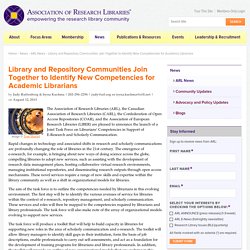
Rapid changes in technology and associated shifts in research and scholarly communications are profoundly changing the role of libraries in the 21st century. The emergence of e-research, for example, is bringing about new ways of doing science across the globe, compelling libraries to adopt new services, such as assisting with the development of research data management plans, hosting collaborative virtual research environments, managing institutional repositories, and disseminating research outputs through open access mechanisms. A preliminary report will be available in spring 2014. Task Force Members About ARL About CARL. Competencies for Scholarly Communication and Open Access June 2016 - Competencies for RDM June 2016 - COAR » Librarians’ Competencies for E-Research and Scholarly Communication. The aim of this task force is to produce a number of competency profiles that will help to build capacity in libraries for supporting new roles in the area of scholarly communication and e-research.
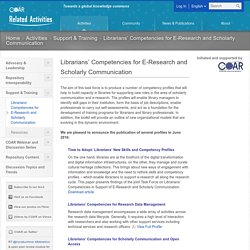
The profiles will enable library managers to identify skill gaps in their institution, form the basis of job descriptions, enable professionals to carry out self-assessments, and act as a foundation for the development of training programs for librarians and library professionals. In addition, the toolkit will provide an outline of new organizational models that are evolving in this dynamic environment. We are pleased to announce the publication of several profiles in June 2016: Time to Adopt: Librarians’ New Skills and Competency Profiles On the one hand, libraries are at the forefront of the digital transformation and digital information infrastructures, on the other, they manage and curate cultural heritage collections.
Guidelines: Competencies for Special Collections Professionals. Prepared by the Rare Books and Manuscripts Section, ACRL/ALA Task Force on Core Competencies for Special Collections Professionals Approved by the ACRL Board, July 1, 2008 Contents I.
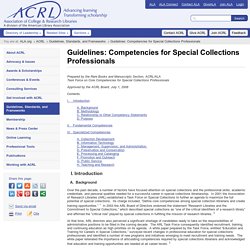
Introduction A. RUSA Professional Competencies for Reference and User Services Librarians 2017. Association of College & Research Libraries (ACRL) - Approved by the ACRL Board of Directors, October 2011 Revision approved by the ACRL Board of Directors, February 2018 Print copies of the 2018 revision will soon be available from the Association of College and Research Libraries for $15.00 for a package of 10, including standard postage.
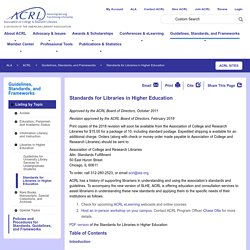
Expedited shipping is available for an additional charge. Orders (along with check or money order made payable to Association of College and Research Libraries) should be sent to: Association of College and Research Libraries Attn: Standards Fulfillment 50 East Huron Street Chicago, IL 60611 To order, call 312-280-2523, or email acrl@ala.org. ACRL updating Standards for proficiencies for instruction librarians and coordinators. EALD elaborations - Australian Professional Standards for Teachers - Library Creation and Learning Centers. Assisting patrons with technology is an increasingly common responsibility for public service library staff.
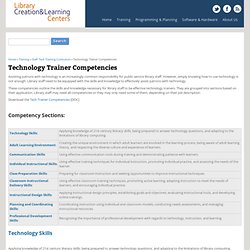
However, simply knowing how to use technology is not enough. Library staff need to be equipped with the skills and knowledge to effectively assist patrons with technology. These competencies outline the skills and knowledge necessary for library staff to be effective technology trainers. They are grouped into sections based on their application. Library staff may need all competencies or they may only need some of them, depending on their job description. Download the Tech Trainer Competencies [DOC] Competency Sections: Technology Skills. New Top Ten (10) Social Media Competencies for Librarians (& Teachers) An excellent post from Dean Guistini: Top Ten (10) Social Media Competencies for Librarians…07.26.10 “1.
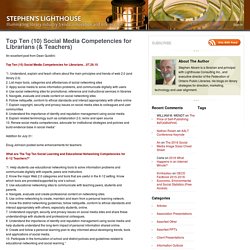
Understand, explain and teach others about the main principles and trends of web 2.0 (and library 2.0) 2. List major tools, categories and affordances of social networking sites 3. Apply social media to solve information problems, and communicate digitally with users 4. Addition for July 31: Trainer Competencies: an edited Compendium. Edited and Adapted by Maurizio Morselli, MSEd, Long Island University, 2001 on both the quality of the presentation, and receptivity bytrainees.4.
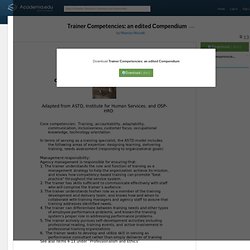
The trainer demonstrates the use of name tags/name tents, "ice-breaker" exercises, introductions, and other activities at thebeginning of a session to create a positive group climate andbegin the engagement process.5. The trainer demonstrates the ability to speak clearly at anappropriate volume; can vary volume, pace, tone, and inflection tomaintain trainee's attention; and can avoid unnecessary anddistracting vocalizations ("uh," "ummm," "you know," "like," "Imean. ")6. The trainer can adjust his/her presentation methods, use of language, and group management style to achieve the optimallevel of formality for the group, and/or to match learners’ level of expertise.7. C. Library.Skills.Audit .PD .20130529. ACRL Proficiencies for Assessment Librarians and Coordinators. Competencies for Information Professionals Special Libraries Association. Approved 13 April 2016 by the Board of Directors of the Special Libraries Association Data, information, and knowledge are critical to the functioning of modern organizations and today’s society.
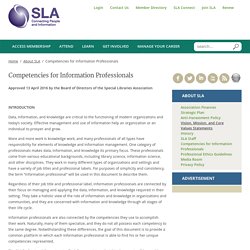
Effective management and use of information help an organization or an individual to prosper and grow. More and more work is knowledge work, and many professionals of all types have responsibility for elements of knowledge and information management. One category of professionals makes data, information, and knowledge its primary focus. These professionals come from various educational backgrounds, including library science, information science, and other disciplines. Article - Competencies for information specialists in emerging roles. Article on competencies for data management. NASIG Core Competencies for Scholarly Communication Librarians - Core Competencies for Schol.
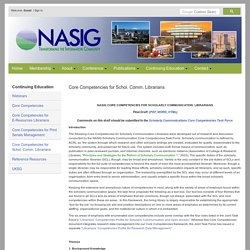
Comm. Librarians Final Draft (PDF, WORD, HTML) Comments on this draft should be submitted to the Scholarly Communications Core Competencies Task Force Introduction. NASIG NASIG Core Competencies for Electronic Resources Librarians - Core Competencies for E-Resources Librarians Final Version (PDF, WORD, HTML) Approved and adopted by the NASIG Executive Board, July 22, 2013 Revised with minor edits by CEC, January 26, 2016 Introduction The Core Competencies for Electronic Resources Librarians are based on research completed by the NASIG Core Competencies Task Force (NCCTF) and by its members individually.
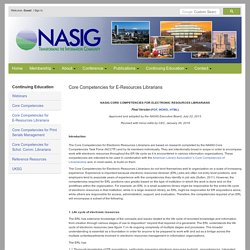
The Core Competencies for Electronic Resources Librarians do not lend themselves well to organization on a scale of increasing experience. 1. The ATD Competency Model™ DigComp 2.0: The Digital Competence Framework for Citizens. Update Phase 1: the Conceptual Reference Model. EntreComp: The Entrepreneurship Competence Framework - Abstract: The development of the entrepreneurial capacity of European citizens and organisations is one of the key policy objectives for the EU and Member States. Ten years ago, the European Commission identified sense of initiative and entrepreneurship as one of the 8 key competences necessary for a knowledge-based society. The EntreComp framework presented in this report proposes a shared definition of entrepreneurship as a competence, with the aim to raise consensus among all stakeholders and to establish a bridge between the worlds of education and work.
Developed through a mixed-methods approach, the EntreComp framework is set to become a reference de facto for any initiative aiming to foster entrepreneurial capacity of European citizens. Web Literacy - Mozilla Learning-